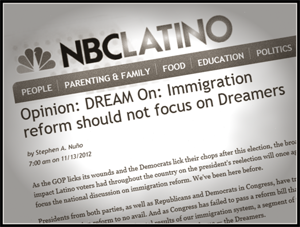Now that the GOP leadership has signaled its eagerness to again support the Democrat drive for amnesty and open borders, a fight has broken out on the other side. This is a revival of the public spitting match between the “comprehensive” amnesty crowd in D.C., who want amnesty for all illegal aliens or nothing, and the DREAMers, illegal aliens who came here as children, who are willing to cut a separate deal for themselves.

The fight has resurfaced on NBC Latino’s website (why is there such a thing?), where a professor Stephen Nuno has written that “Immigration reform should not focus on Dreamers” because “I think Dreamers can be detrimental to the goal of immigration reform.” He concludes:
To put it bluntly, Dreamers think they are special. They feel entitled. They’re cute. They’re smart. They make people cry because of their compelling stories. But that’s not special. And if times get tough for the president, I fear he may use the Dreamers as a pressure valve. He may focus the debate away from comprehensive reform and towards this small group of vocal undocumented immigrants.
I have a problem with that. Dreamers aren’t special. They don’t suffer disproportionately for being undocumented. Besides the individual level storytelling, they have not moved the debate except to focus much of the debate on them. I have a problem with that. I think that needs to change before we go back into the fray.
The return salvo came the next day
, again at NBC Latino, from DREAM activist Juan Escalante, who criticized “a failed top-down strategy of the immigration reform movement.” In observing why amnesty didn’t get passed by the Democrats’ 2009–2010 supermajority, he writes:
When faced with the possibility of failure, many “pro-migrant” organizations were quick to point out that this was an all-or-nothing fight – meaning that if comprehensive immigration reformed failed, then everything went with it. There would be no option to pass the DREAM Act as a standalone bill. Undocumented youth would eventually come to shoulder responsibility for “gutting” the comprehensive immigration reform bill by standing up to their “advocates” and putting the brakes on their “let everything fail” scheme.
The DREAMers have been successful precisely because they are so Americanized and understand what button to push for public sympathy, unlike the illegal-alien activists who came here as adults and were more likely to have been formed in an anti-American, often Marxist environment, like, for instance, Gustavo Torres, director of Casa de Maryland. You can almost taste Escalante’s just resentment:
Time and time again since the inception of the DREAM Act, it has been undocumented youth who have been pushed to the bottom of the barrel — forcing us to create our own spaces, our own strategy, our own tactics, and our own agenda, just so that we could later be talked down to for creating the tools that would enable us to grow. . . .
The fact is that we, the youth of this immigrant rights movement, are special. Special enough to not let ourselves be bought or bullied by anyone — not politicians, not “allies.” Nobody.
His conclusion again shines a light on the opportunity that Republicans should have embraced earlier:
Nobody is foolish enough to think that achieving a comprehensive immigration reform will be easy, but you can rest assured that should said plan come and go with no results, we will try to push for a smaller reform — even if it’s JUST the Dream Act.
A modified version of the DREAM Act has much to recommend it, precisely because the DREAMers are special, or at least a special case — those who came here as infants and toddlers truly have been formed here, psychologically and emotionally, and are, in some sense, Americans in all but paperwork. Legalizing them in a bill that also incorporates Lamar Smith’s mandatory E-Verify bill and the elimination of chain migration, could be a huge step forward.


